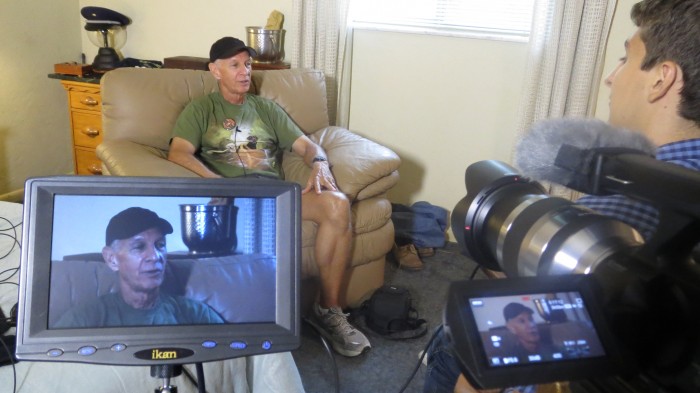Every semester, SPOHP’s interns are in some way touched by United States servicemen, past and present. Whether they transcribe a sixty-year-old recording with one of the last living Civil War veterans or talk with a former leader of the Vietnam Veterans Against the War, UF undergraduates encounter the intense experiences of American veterans through oral history.
In another sense, the hundreds of Veterans History Project interviews in SPOHP’s collection testify to the ways that both war and veterans themselves have transformed American life as our students study and live it. On this Veterans Day, the intern class of Fall 2014 appreciates, and tries to understand, the crises and trauma endured by young people before them.
-Jessica Taylor, Graduate Coordinator
Are you a veteran? Call the Samuel Proctor Oral History Program at 352-392-7168 or e-mail VHP Coordinator Ann Smith to share your story. Visit the VHP collection site for more information.
Annemarie Nichols, on WWII-251 with Jerry Barshov
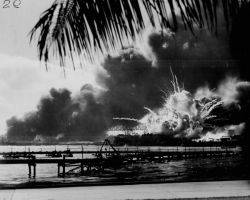
In the middle of October, I had the wonderful opportunity to interview Mr. Jerry Barshov. I interviewed Mr. Barshov about his wartime experiences. Right after high school, Mr. Barshov enlisted in the United States Army. After basic training, he was stationed to Bath, England. He recalled one night in Bath where many planes were continually flying overhead, headed south to France. The next day, he learned that they were headed to Normandy for D-Day. Eight days after D-Day occurred, Mr. Barshov and his fellow soldiers landed on Omaha Beach. They followed the path leading into the interior of France carved out by the soldiers who came before them, finally reaching Alsace-Lorraine. Eventually, Mr. Barshov was assigned to work in a factory in Belgium. After VE Day, he was sent from Belgium in the European Theater to the the Philippines in the Pacific Theater. After a fifty day boat ride crossing the Atlantic Ocean, Panama Canal, and Pacific Theater, he finally arrived in the Philippines where he was stationed until he accumulated enough points to go back to his home in Brooklyn, New York.
When I contemplate Mr. Barshov’s story, I am struck by his connection with the people he met on the way. Throughout his reminisces, he always tells of the families and people he befriended along the way, and he spoke several different languages he learned from these people. His connection went beyond a friendly Learning the story of Mr. Barshov helped me to realize that World War II wasn’t only the story of the Allied forces against the Axis powers. It wasn’t only clashing political ideologies and glorious, bloody military campaigns.
It affected everyday people from all different national and cultural backgrounds on a fundamental level, but having the opportunity to listen to Mr. Barshov’s story helped me to realize that World War II isn’t only the story of highly mechanized modern warfare or political summits or homefront industrialization. It’s also the story of the lives of millions of hungry, scared, and unfathomably courageous everyday individuals who desperately wanted to connect with others and find order and peace in a time of great uncertainty and suffering.
Mariah Justice, on AND-029 with Claris Levert
Never have I seen war, nor have I ever been held captive—many of us never have. Claris Levert has experienced both circumstances, and tells an incredible story that is surprisingly relatable to us all as human beings. Held captive for three years by the Chinese in the Korean War, Levert experienced horrors that are beyond the imaginations of most of us, yet he shows the human spirit’s inspiring ability prevail. Levert himself says, “Human nature is what I was thinkin’ about. Human nature will always prevail no matter what condition or circumstance you are in.” He was certainly subjected to some poor circumstances. Levert was without freedom for three years being held in a Chinese POW camp.
He explains, “Well, I recall in the camp that I was inn, just about every night there was an airplane, it was a prop-job, would fly over the camp, and of course he would be an altitude that would be at least probably twelve, fifteen thousand feet or maybe higher, and never knew what type of plane it was or anything. But each time I heard him and saw him I said that guy is free. And you never know what freedom is until you lost your freedom.”
During his imprisonment, Levert was forced to bury the bodies of the POW’s that had died during the night prior. He describes his experience, “And then we’ll cover the bodies and say a prayer and then we’ll go back and quite often you never knew whether you would be the next one to be put in that grave the next day. You never knew.”
The realization of his overwhelming mortality, yet his decision to endure, is what sets Claris Levert apart and allows his experience and, what I would call his victory, to be equally relatable and inspiring.
Arielle Heinke, on WWII-144 with Bob Gasche
Bob Gasche witnessed immeasurable carnage, trauma and death in his two weeks of combat in Iwo Jima, but the experience further strengthened his commitment to serving his country. He wasn’t deterred by the shrapnel in
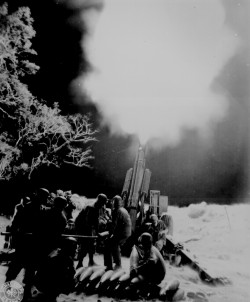
his stomach, or the death of his best friend, instead, he was invigorated.
His life has become defined by his service; he is an active member of veterans associations in the area and has dedicated himself to educating others on what exactly happened on that island in the Pacific.
His and other survivors’ memories are what keeps alive the heroics and courage of comrades who have fallen. Because of him, I know the final moments of a young man who died split open by a machine gun on the beaches of Iwo Jima seventy years ago. Bob commemorates all his comrades for their bravery, but doesn’t want to take any credit for himself, which I find astounding. He has so much insight on what happened to everyone else, yet he fails to see that he was just as brave, just as valiant as the rest of them. For all the memories of gunfire, black ash and blood, he remembers the positive and continues to honor those who died everyday.
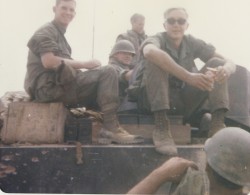
Christian Wanamaker, reflection on VWV-107 with Stephen Dodd
War is hell. This oft-spoken sentiment is cited by veterans across wars and generations trying to capture and paraphrase their experience in war. While it may border being clichéd, it is no less true now than it was decades ago.
It does, however, draw one’s attention away from another aspect of war for the veteran: the post-war phase. Stephen Dodd’s experience as an infantryman in Vietnam was surely hellish, but equally as trying was his return home as he attempted to acclimate to a changed society with a severe case of undiagnosed Post-Traumatic Stress Disorder.
For a twenty-year period after his return home from Vietnam, Stephen struggled to maintain healthy relationships with his family and could hardly hold down a job. Nightmares and flashbacks from his time in Vietnam were common, unpredictable, and outside of his control. To hear Stephen reflect on experiences in Vietnam was at times difficult for me, and as we began to talk about his return home I thought we had already covered the toughest topics. Instead, his story became even darker as he recounted divorces, panic attacks, and alienation for many years after he thought his trials were over. The tone of the interview may have been melancholy, but it also left me encouraged to see someone who’d endured such suffering could recount his experiences with a rough smile.
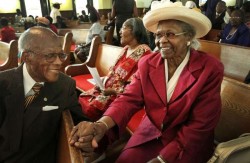
Jasmine Reynolds, on AAHP-357 with Sollie Mitchell
My veteran reflection is on Mr. Sollie Mitchell, the World War II veteran I interviewed in Jacksonville, Fl. Mr. Mitchell is 96 years old and seems to have a very clear memory of his life throughout the years. When I arrived in Jacksonville he was leaving his house to take out the trash with a huge smile on his face. I found him to be very nice and approachable as well as very able-bodied. When I began the interview he talked about his experiences as a weapons supplier in WWII as well as a Pullman Porter for the railroad company in which he retired from. He also surprisingly talked about A. Philip Randolph as well as meeting presidents such as Harry Truman who often traveled to and from Key West by railway for vacations.
I loved doing this interview with Mr. Mitchell because I loved hearing him talk about his experiences and the things that he was able to do when other African-American men did not have the opportunity to do so. The thing that I got out of this interview with Mr. Mitchell is that I should remain positive and to not dwell on things I can’t control.
I found it difficult to find any African-American WWII veterans in Gainesville and was actually surprised when I found Mr. Mitchell in Jacksonville thanks to a lot of emails from different people. The most exciting thing that I got from the interview was that my granddad, who was also a WWII veteran and a retired railroad worker was an acquaintance of Mr. Mitchell.
Virginia Hamrick, on AND-023 with William Smith
William Smith served in the Korean War, where he was taken as a prisoner of war from 1950 to 1953. Half a century later, the descriptions of his captivity remain detailed and vivid. Describing his capture by North Korean soldiers, he explained, “My eyes were bleeding. My nose was bleeding. My ears was bleeding, and my head was a-ringing.” I was surprised by Smith’s sensory details. Smith may not have been able to tell the interviewer how old he was when he was captured, but he could remember how he felt during the capture.
Smith described the difference between the physical and mental abuse of his captors. Smith preferred the physical abuse, explaining “the physical torture you can pass out…the mental torture stays with you all the time.” He could pass out, and the physical pain would temporarily go away, but the mental pain would not ceases.
While listening to his interview, I though Smith had trouble breathing. I later found out he was crying. Smith was away from the United States for six years. For three of those years, he was held captive by North Korean and Chinese forces. For someone who has been alive for seventy years, three years is a small fraction. For veterans, like Bill Smith, three years can be life-changing.
At the end of Bill Smith’s interview, I almost cried. He asks the interview if this oral history will help anyone. I know it helped me; The interview gave me a greater understanding for what is as like to be a prisoner of war, and what it was like to adjust back into life in the United States.
Pictured: Intern alumni and volunteer Derick Gomez conducting an interview for the Vietnam War Veterans project. For additional information about these and other histories, contact SPOHP, call the offices at (352) 392-7168, and connect with us online today.
